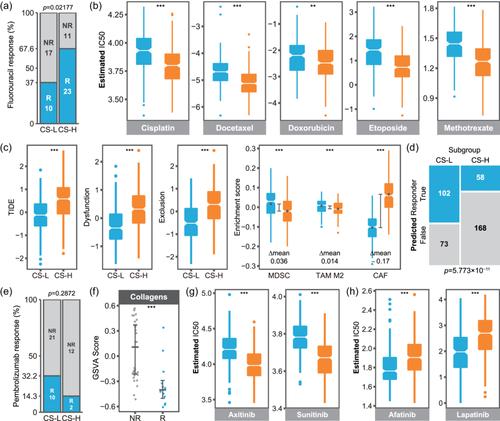Identification of collagen subtypes of gastric cancer for distinguishing patient prognosis and therapeutic response
Abstract
Background
Gastric cancer is a highly heterogeneous disease, presenting a major obstacle to personalized treatment. Effective markers of the immune checkpoint blockade response are needed for precise patient classification. We, therefore, divided patients with gastric cancer according to collagen gene expression to indicate their prognosis and treatment response.
Methods
We collected data for 1250 patients with gastric cancer from four cohorts. For the TCGA-STAD cohort, we used consensus clustering to stratify patients based on expression levels of 44 collagen genes and compared the prognosis and clinical characteristics between collagen subtypes. We then identified distinct transcriptomic and genetic alteration signatures for the subtypes. We analyzed the associations of collagen subtypes with the responses to chemotherapy, immunotherapy, and targeted therapy. We also established a platform-independent collagen-subtype predictor. We verified the findings in three validation cohorts (GSE84433, GSE62254, and GSE15459) and compared the collagen subtyping method with other molecular subtyping methods.
Results
We identified two subtypes of gastric adenocarcinoma: a high-expression collagen subtype (CS-H) and a low-expression collagen subtype (CS-L). Collagen subtype was an independent prognostic factor, with better overall survival in the CS-L subgroup. The inflammatory response, angiogenesis, and phosphoinositide 3-kinase (PI3K)/Akt pathways were transcriptionally active in the CS-H subtype, while DNA repair activity was significantly greater in the CS-L subtype. PIK3CA was frequently amplified in the CS-H subtype, while PIK3C2A, PIK3C2G, and PIK3R1 were frequently deleted in the CS-L subtype. CS-H subtype tumors were more sensitive to fluorouracil, while CS-L subtype tumors were more sensitive to immune checkpoint blockade. CS-L subtype was predicted to be more sensitive to HER2-targeted drugs, and CS-H subtype was predicted to be more sensitive to vascular endothelial growth factor and PI3K pathway-targeting drugs. Collagen subtyping also has the potential to be combined with existing molecular subtyping methods for better patient classification.
Conclusions
We classified gastric cancers into two subtypes based on collagen gene expression and validated these subtypes in three validation cohorts. The collagen subgroups differed in terms of prognosis, clinical characteristics, transcriptome, and genetic alterations. The subtypes were closely related to patient responses to chemotherapy, immunotherapy, and targeted therapy.


 求助内容:
求助内容: 应助结果提醒方式:
应助结果提醒方式:


